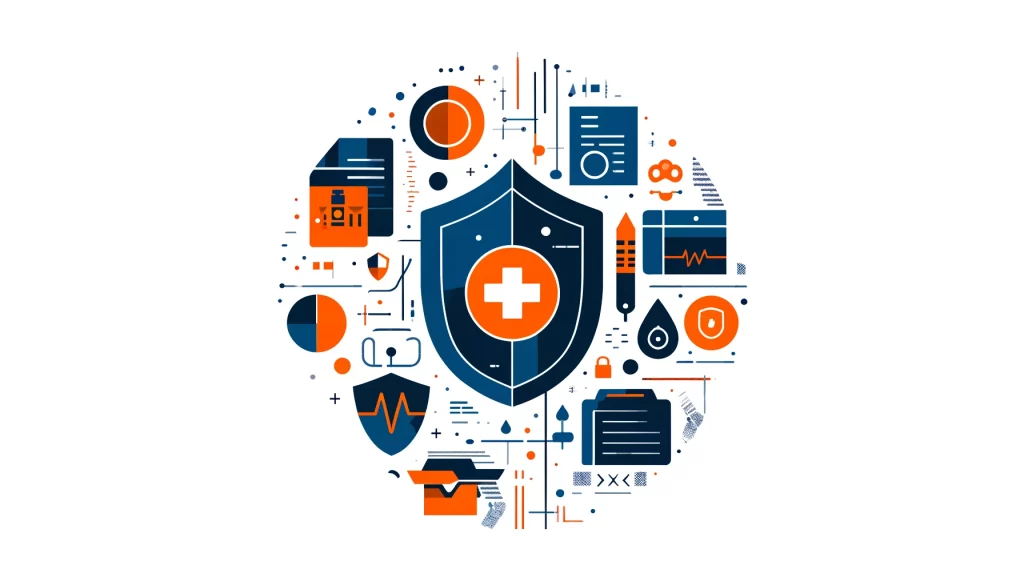
Secure Management of Protected Health Information (PHI) in Healthcare

In the healthcare industry, protecting patient privacy and ensuring the security of sensitive information is of utmost importance. Protected Health Information, or PHI, is a crucial concept in the healthcare industry that deals with it.
PHI stands for any information that can identify people and emerges during healthcare services. Healthcare providers, organizations, and anyone working with patient data should understand how to handle it properly. Knowing what PHI is and how to handle it correctly is crucial for them.
What is Protected Health Information?
Protected Health Information includes various data points related to a person’s healthcare. Healthcare providers create, use, or share this information, which can identify the patient. PHI includes medical records, treatment plans, prescription information, and billing records, among other things. PHI can include physical documents and verbal communications, not just digital data.
Examples of Protected Health Information
To better understand what falls under the category of PHI, let’s look at some typical examples:
- Healthcare provider details: This includes information about the doctors, nurses, and other healthcare professionals involved in a patient’s care.
- Financial information for healthcare services, like insurance details, billing records, and bank account information.
- These regulations protect the diagnosis and treatment details. This includes information about medical conditions, test results, medications, and treatment plans.
- Geographic identifiers like address or ZIP codes, as they can identify a patient.
- Contact information: Patient names, phone numbers, email addresses, and other contact details.
- Biometric identifiers: Fingerprints, genetic information, voiceprints, and retinal scans are examples of biometric data that fall under the umbrella.
Identifying Protected Health Information
If the information is about a patient or used in healthcare, it is PHI and healthcare providers must keep it safe. This includes information that the patient can trace back to, whether directly or indirectly.
Data that cannot refer to individuals, otherwise its source is not PHI. Examples of non-PHI data include encrypted heart rate monitor patterns, temperature scans, and aggregated blood test results.
The Creation and Storage of Protected Health Information
Healthcare providers create PHI when they use healthcare services and save it in digital storage systems. These storages store text documents, payment information, appointments, and medical images like MRIs and X-rays. When organizations store it digitally, they often refer to it as electronic Protected Health Information (ePHI).
The HIPAA Security Rule and Protected Health Information
The Health Insurance Portability and Accountability Act (HIPAA) Security Rule sets the standards for protecting ePHI. This rule sets up guidelines to protect and use PHI safely, including managing, securing, and using technology properly. These safeguards ensure the privacy, integrity, and availability of PHI, protecting it from unauthorized access, use, or disclosure.
Healthcare organizations and providers must adhere to the HIPAA Security Rule when handling PHI. This includes implementing access controls, encrypting data, and regularly training employees on proper PHI handling procedures. Failure to comply with HIPAA regulations can result in significant fines.
The Importance of Protecting Protected Health Information
Safeguarding PHI is not only a legal requirement but also an ethical obligation for healthcare providers and organizations. Patients trust the healthcare system with their private information. Important for those who manage this data to keep it safe and secure.
A breach of PHI can lead to serious issues for patients and healthcare organizations. These issues include identity theft, financial losses, and damage to the patient-provider relationship.
Moreover, protecting PHI is essential for maintaining patient trust and ensuring the smooth functioning of the healthcare system. Patients are more likely to seek medical care when they feel confident about the security of their personal information. They are also more likely to communicate openly with their healthcare providers.
Feeling safe about their personal information is important for people to feel comfortable seeking medical care and communicating effectively. This, in turn, leads to better health outcomes and a more efficient healthcare system.
Strategies for Safeguarding Protected Health Information
To effectively protect PHI, healthcare organizations must implement a comprehensive security strategy that addresses both technical and non-technical aspects of data protection. This includes:
- Access controls: Implementing strict access controls ensures that only authorized individuals can view and modify it.
- Encryption keeps PHI safe by securing it when stored and transmitted, even if there is a security breach. Encryption also protects it when transmitting it.
- Employee training is important for making sure all staff members know how to protect patient data. Regular training on HIPAA regulations and proper handling of PHI is necessary.
- Risk assessments: Conducting regular risk assessments helps identify potential weaknesses in security measures, allowing for proactive mitigation of threats.
- Having a clear plan for responding to incidents is important. This helps reduce the impact of a breach and ensures a quick and effective response.
The Future of Protected Health Information
As technology gets better and healthcare goes digital, it’s more important than ever to keep PHI safe. Health wearables and the Internet of Medical Things have made personal health information more accessible online. People are creating and storing this information in larger quantities than before. Healthcare organizations can use data to improve patient care and security, but they also face challenges in doing so.
One promising development in the realm of PHI protection is the use of blockchain technology. Blockchain is a secure way to store and manage PHI. It operates in a decentralized manner, with no single entity controlling it.
This helps reduce the risk of data breaches and unauthorized access. Healthcare organizations can use blockchain technology to securely record patient data transactions. This ensures the accuracy and lawfulness of the information.
Conclusion
Health information is important in healthcare. Handling and protecting it properly is crucial to maintain patient privacy and trust. Healthcare organizations can protect patient data by understanding what PHI is. They can also keep the healthcare system running smoothly by following HIPAA rules.
Additionally, using strong security measures is important for safeguarding patient information. The healthcare industry must stay alert as technology advances. It needs to safeguard patient information, adapt to new challenges, and use innovative solutions.
